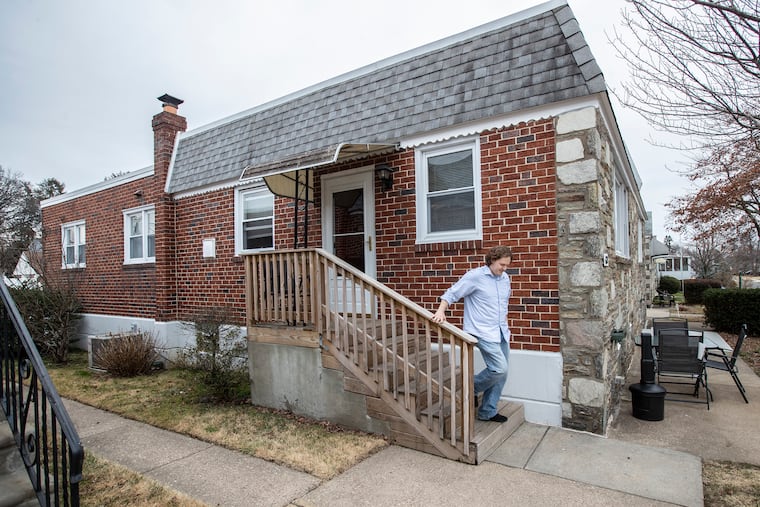How this real estate startup with Philly roots helps those serving the intellectually disabled
Nestidd is happy to take on the real estate management burden so agencies can focus on serving clients with intellectual and developmental disabilities.

Patricia Menszak manages 26 group homes for adults with intellectual and developmental disabilities in Delaware and Chester Counties.
And one house, in Drexel Hill, no longer suits the three women who live there, because they can’t climb stairs anymore.
Instead of having to find a replacement house herself, Menszak turned to Nestidd, a two-year-old start-up that buys single-family houses, customizes them, and leases them to service providers like the one Menszak works for, Catholic Social Services. The company also offers to cut the grass, remove snow, and perform other maintenance.
“We’re going to rent the one for the ladies at the new location. We’ll have a lease agreement with them for that location, and then they will buy the home that we own,” Menszak said. “It’s a win-win.”
Menszak previously used Nestidd, cofounded in 2017 by Philadelphia-area native Andrew Parker, for a house for three men in Prospect Park.
Parker, who grew up near Valley Forge and graduated from Conestoga High School in 2007, joined with a college friend from the University of Michigan, Tad Ritter, to found Nestidd to relieve agencies of their real estate burden — a task that lies outside the agencies’ expertise but is essential to serving their clients with intellectual and developmental disabilities in the community.
Though it is based in Chicago, Nestidd owns 25 houses in Pennsylvania out of its 65 total. Because of that, Parker spends about half his time in the Philadelphia area, where his parents live. The other states where Nestidd owns houses are Georgia, Tennessee, North Carolina, Illinois, Nevada, and Texas.
It provides property management for an additional 220 houses, Parker said. Among Nestidd’s newest customers for property management is Media-based Elwyn, which this month started trying out Nestidd’s services for a group of community homes that it owns in New Jersey.
Early last year, the Pennsylvania Department of Human Services said more than 50,000 Pennsylvanians participate in the state’s programs for individuals with intellectual disabilities, including 5,413 licensed group homes with the capacity to care for 18,713 people. Thousands more are on the state’s waiting list.
Nestidd, which said last month that its second investment fund had received $20 million in equity commitments, is tapping a niche in the burgeoning market for single-family home rentals, a sector that has received hundreds of billions of institutional investment since the start of the housing crisis in 2006 and 2007. Among the big players are FirstKey (a Cerberus Capital Management unit) and Invitation Homes (started by the Blackstone Group), Parker said.
One problem with the single-family rental industry is the constant turnover, Parker said. “When you lease a house to a 27-year-old young couple, they’re going to live there for a year and a half, and then they’re going to move out.”
That’s not a problem for Nestidd, which previously raised a $13 million fund. It typically signs five-year leases with agencies serving disabled individuals, Parker said. For a $200,000 house, including all management services, Nestidd typically charges about $2,000 a month in rent, depending on property taxes and other factors. Total revenues are running about $2 million a year.
Scioto Properties, based near Columbus, Ohio, is a competitor that owns more than 1,600 properties in 41 states, serving over 6,500 individuals with developmental disabilities, according to its website. Another competitor is CapGrow Partners, based in Chicago, Parker said.
Nestidd started operating in late 2017, when it bought four houses for Overbrook Friedlander Programs, which is affiliated with Philadelphia’s Overbrook School for the Blind. Overbrook Friedlander Programs operates residential programs for adults with blindness or deaf-blindness and intellectual disabilities.
Early on, Nestidd also bought two homes from Blossom Philadelphia, a group home provider that collapsed in 2017, and now leases them to the Salvation Army, which took over the services, Parker said.
Resources for Human Development leases a dozen homes from Nestidd, said Dennis Roberts, chief program officer for the nonprofit’s intellectual and developmental disabilities services.
“We know service delivery. They know real estate,” Roberts said. “To have someone with expertise that we can work in partnership with is extremely helpful.” Roberts cited zoning and building codes as areas where Nestidd is helpful.
Plus, Roberts said, by working with Nestidd, Resources for Human Development can take resources that it would have put toward finding and managing real estate into services for clients.
Menszak, administrator for the Communities of Don Guanella, part of the Archdiocese of Philadelphia, said she has an additional seven properties she rents for clients and plans to move all of that business to Nestidd as those leases expire.
“That is absolutely the intention,” she said.